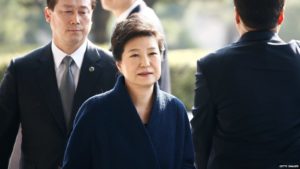Special to WorldTribune.com
 By Donald Kirk
By Donald Kirk
The prospect of Park Geun-Hye going to jail in the most sweeping political scandal in modern Korean history inspires invidious comparisons. Who, actually, was the most corrupt president since promulgation of the “democracy constitution” in 1987 at the height of demonstrations as massive as those we have witnessed in central Seoul since October?
None in this cast of characters managed to escape charges that blackened their names after their years of power and glory in the Blue House.

In assessing their legacies, amazingly Park seems by no means the guiltiest. In fact despite the 13 charges against her, she may someday be revered as a tragic figure besieged by enemies after a career suffering alone since the assassinations first of her mother and then of her father, the long-ruling Park Chung-Hee.
Many will insist that Park Chung-Hee was far worse than his daughter. He seized power in a coup on May 16, 1961, against a democratic government that had risen after the student revolution of April 1960 that brought down Rhee Syngman, the Republic of Korea’s first president, who had led the country through the Korean War.
As president, Park ruthlessly destroyed his enemies while imposing a constitution that made no pretense of holding democratic values.
As the first president elected under the 1987 constitution, Roh Tae-Woo, a former general, succeeded his Korea Military Academy classmate Chun Doo-Hwan, who was as dictatorial as Park Chung-Hee but not as smart. It was not until the election of Roh’s successor, Kim Young-Sam, in 1992, that Roh and Chun were jailed for their harsh crackdown on the Gwangju uprising of May 1980 in which more than 200 people were killed by rampaging soldiers.
Chun and Roh, besides being cruel, were also corrupt. Chun’s record of greed extended through his family and that of his wife. Roh acquired enormous wealth while his daughter married Chey Tae-Won, the SK chairman who’s twice been imprisoned for corruption.
Democracy, Korean-style, advanced under Kim Young-Sam, a long-time foe of the dictatorship of his military predecessors, but his son was caught up in a bribery scandal that tarred his image.
And Kim Dae-Jung, elected in a shocking upset over his conservative rival in 1997 after Korea had to ask the International Monetary Fund for a bailout, wound up apologizing when two of his sons were arrested for financial transgressions.
Nor could DJ himself escape criticism for having fostered a different form of corruption the secret movement of vast sums to North Korea to bring about his summit with North Korea’s “Dear Leader” Kim Jong-Il in Pyongyang in June 2000.
Hearings conducted by a special prosecutor revealed that $450 million had gone from South Korean coffers to North Korea via Hyundai Asan, the arm of the Hyundai empire responsible for dealings with the North, notably the Gaesong Industrial Complex and the Mount Geumgang tourist zone.
At the height of the hearings, while DJ”s successor, Roh Moo-Hyun, was president, the chairman of Hyundai Asan, Chung Mong-Hun, fifth son of Hyundai founder Chung Ju-Yung, jumped to his death from his 14th-floor headquarters in central Seoul.
The hearings might have exposed still greater transactions in the cause of inter-Korean reconciliation had Roh Moo-Hyun, a former labor lawyer, extended them. As president, however, Roh seemed incorruptible. Then, after completing his term, caught up with his wife in a relatively minor scandal, a matter of a few million dollars, Roh jumped to his death off a cliff near his home outside Busan.
How is one to compare this litany of presidential malfeasance with that of Park Geun-Hye? The offenses committed by former presidents fit into a pattern of greed and, in the case of Chun and Roh Tae-Woo, ruthless cruelty.
Aside from being Korea’s only female president, however, Park has the distinction of having been the only one ousted before the end of her term.
If history is any guide, Park’s future may not be so bleak after all.
YS pardoned Chun and Roh in time for DJ’s inauguration.
The next president might do the same for Park rather than risk outrage from diehard fans to whom she remains a hero humiliated in a court of public opinion.
Donald Kirk has covered all Korea’s post-1987 presidential elections and is the author of books about Kim Dae-jung and Chung Ju-yung. He’s reachable at kirkdon4343@gmail.
